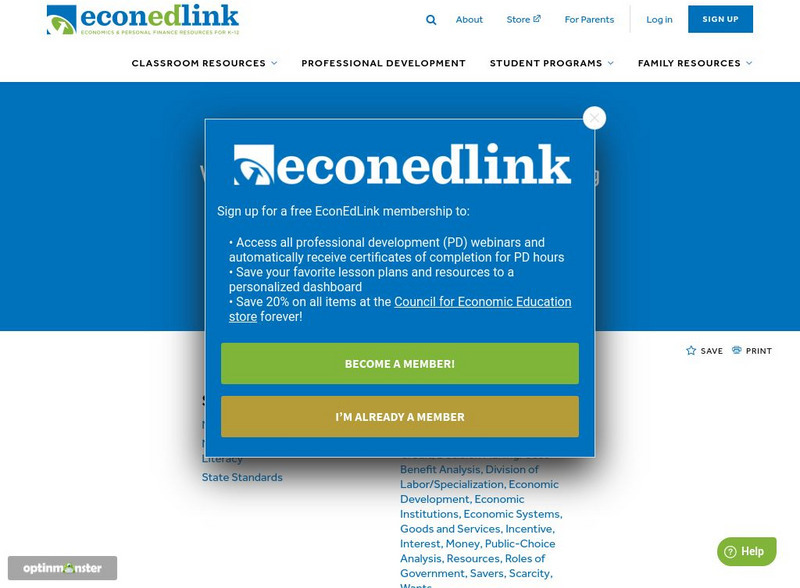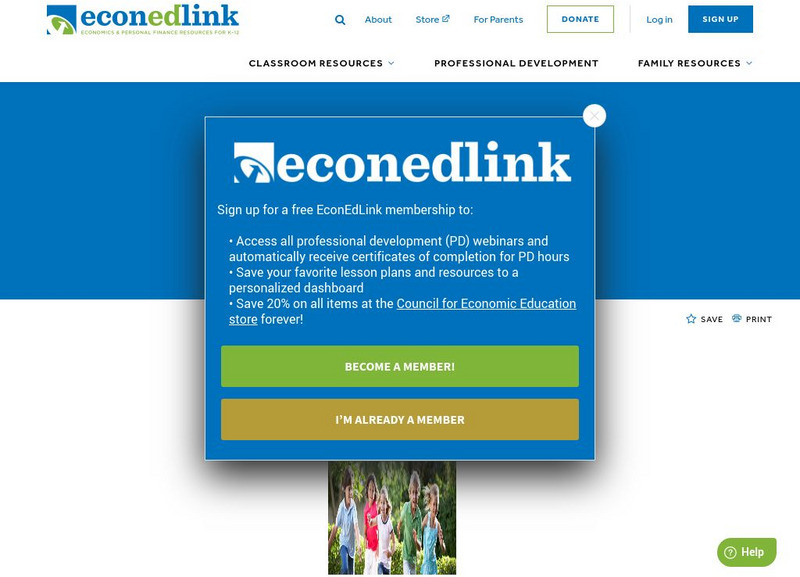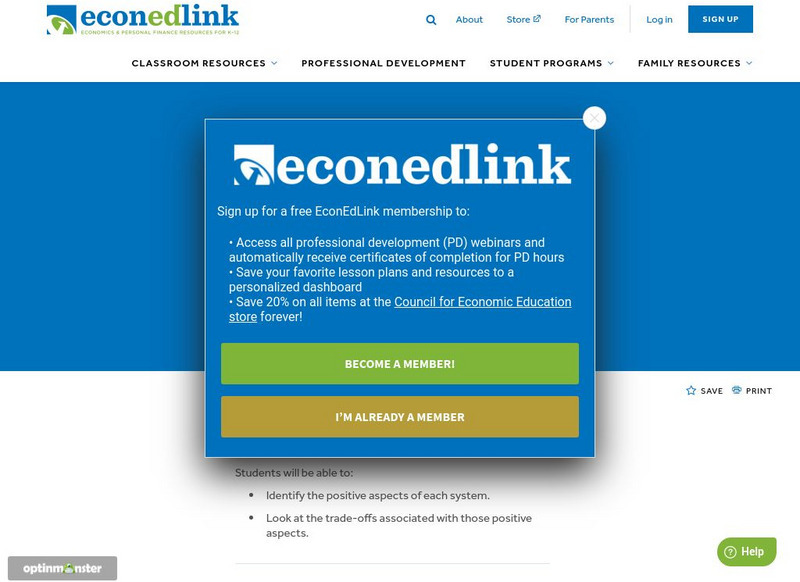Council for Economic Education
Econ Ed Link: Work, Earnings and Economics: Using Lyddie by Katherine Paterson
In reading and discussing Lyddie, by Katherine Paterson, students examine basic economic concepts and explore the growth of labor unions and the role of government in a market economy.
Khan Academy
Khan Academy: Economic Systems, the Role of Incentives, and Circular Flow Model
A summary of the circular flow model which demonstrates the interdependence of households and firms in a market system.
Other
Foundation for Teaching Economics: Homepage
The Foundation for Teaching Economics is committed to excellence in economic education. The Foundation offers free workshops for high school educators and students. This site includes workshop dates, locations, and registration...
Other
Foundation for Teaching Economics: Lesson 2: Opportunity Cost and Incentives
This lesson plan covers the National Content Standard 2: Marginal Decision Making. It provides key terms and concepts around scarcity forces, changing opportunity costs which affect incentives and choices. It includes links to a...
Council for Economic Education
Econ Ed Link: Transportation: They Say We Had a Revolution (Part 1)
Advancements in transportation have played a key role in the growth of our nation. U.S.government policies have also had a considerable impact on the development of transport as we know it today. In this series of three lessons, the...
Auburn University
Auburn University: A Glossary of Political Economy Terms: Public Goods Defined
This site is an excellent explanation of the economic concept of public goods. The Auburn University site is part of a dictionary of political economic terms.
Council for Economic Education
Econ Ed Link: Transportation: They Say We Had a Revolution (Part 3)
Advancements in transportation have played a key role in the growth of our nation. U.S. government policies have also had a considerable impact on the development of transport as we know it today. For this series of three lessons, the...
Council for Economic Education
Econ Ed Link: The Mystery of Is It Mine or Ours?
Students will learn that people respond predictably to positive incentives (rewards) and negative incentives (penalties). They will identify incentives in their daily lives at home and school. Students will discuss which incentives have...
Council for Economic Education
Econ Ed Link: Be All You Can Be for Minimum Wage? (Educator Page)
This instructional activity ask students to calculate the percentage change in military strength over the last two decades, hypothesize economic (and non-economic) explanations for these changes, test hypothetical explanations by reading...
Council for Economic Education
Econ Ed Link: Be All You Can Be for Minimum Wage? (Student Page)
This lesson ask students to calculate the percentage change in military strength over the last two decades, hypothesize economic (and non-economic) explanations for these changes, test hypothetical explanations by reading an economic...
Council for Economic Education
Econ Ed Link: Competition Pizza
A lesson that teaches about competition in the marketplace that uses student-gathered information about businesses where they live. Includes student activities and links to national standards in economics and personal finance.
Council for Economic Education
Econ Ed Link: Keep the Strike Going? Or End It? That Was the Question
In this lesson students will be able to describe the circumstances around the 1998 NBA players strike, list the incentives that influenced player and owner decisions, and identify the costs and benefits the strike had on various groups.
Council for Economic Education
Econ Ed Link: The Economics of Voting: What Do You Mean My Vote Doesn't Count?
This lesson explores the costs and benefits associated with voting in national elections. Specifically, the concepts of rational apathy, rational ignorance and expressive voting are explained.
Council for Economic Education
Econ Ed Link: Baseball Economics 201
Some believe our national pastime may be threatened by the big market, high revenue teams like the Yankees (or the New York Mets, Chicago Cubs, Boston Red Sox, etc.) and that smaller market teams (e.g., the Florida Marlins, San Diego...
Council for Economic Education
Econ Ed Link: The Economics of Recycling
Students will review the legislation in Japan that requires all consumers to pay a fee for recycling large appliances.
Council for Economic Education
Econ Ed Link: The Economics of Voting
Since the 1960s, many Americans eligible to vote have not bothered to do so- not even in presidential elections. Low rates of participation in voting have been worrisome to people interested in preserving our democratic traditions....
Council for Economic Education
Econ Ed Link: Clipping Coupons
Explore this website to find out how and why consumers make choices on what products to buy. Learn how producers entice consumers into buying their products. This is a very informative lesson plan.
Federal Reserve Bank
Federal Reserve Bank of Philadelphia: Ten Mile Day [Pdf]
Using the book, Ten Mile Day, by Mary Ann Fraser, this lesson helps children understand division of labor, competition, and incentives in the workplace.
Council for Economic Education
Econ Ed Link: The Entrepreneur in You
This website is a valuable resource in finding out more about being an entrepreneur. It contains a comprehensive lesson plan detailing what it takes to be an entrepreneur.
Council for Economic Education
Econ Ed Link: Why Cities Provide Tax Breaks
Like the state and federal government, local governments offer tax incentives to businesses to help solve economic and/or environmental problems. In this lesson, students will explore three different cities and determine what incentives...
Council for Economic Education
Econedlink: Government Failures/public Choice Analysis
This video teaches the concepts of Government Failures and Public-Choice Analysis. In the real world, government failure may occur so that government decisions do not represent the majority. Public-choice analysis is the branch of...
Council for Economic Education
Econ Ed Link: Tricks for Treats
Students will recognize that people (and animals) will work for incentives.
Council for Economic Education
Econ Ed Link: The Price We Pay for Health: Us and Canada
Students will review the health systems of United States and Canada. They will identify the positive aspects of each system. They will look at the trade-offs associated with those positive aspects. In Canada, everyone has health care,...
Council for Economic Education
Econ Ed Link: To Buy or Not to Buy
While precise numbers are not known, it is believed the number of boycotts has grown markedly in the past fifty years. Consumers seem to be besieged by requests from special interest groups to refrain from buying certain goods and...










